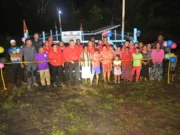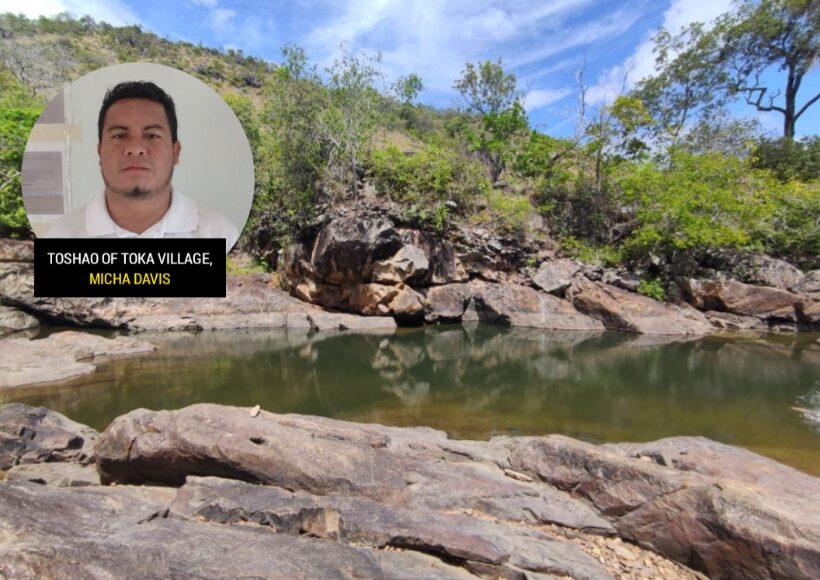Nestled within the stunning North Rupununi Savannah, and against the backdrop of the majestic Pakaraima Mountain Range, is the picturesque Amerindian village of Toka of Region Nine, Guyana.
Toka lies along the Georgetown-to-Lethem trail and is home to approximately 372 Indigenous people of the Macushi tribe. In the Macushi language, “Toka” or “Tîka” means “sharpening stone.”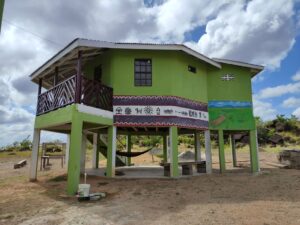
Led by Toshao Micha Davis, the village leader explained in an exclusive interview with the Guyana Standard that the village’s name originates from the practices of the Macushi people many years ago. Hunters passing through the area would pause at what is now Toka to sharpen their weapons on the stones found there—stones that can still be seen today.
While English is widely spoken in urban areas, the people of Toka primarily speak their native Macushi dialect, with English as their second language.
According to Toshao Davis, despite its proximity to Lethem, Toka boasts its own primary and nursery schools, a health post, sports facility, internet hub, multipurpose building, and two tourist cabins complete with a kitchen.
Describing his village, Davis shared, “Toka is a very peaceful community, where you’ll find little to no partying or bars, which I think contributes to the tranquility of the area.”
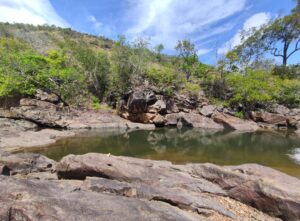
The villagers maintain a simple and traditional way of life, primarily through farming, fishing, and hunting. However, Davis noted that the community is gradually developing, with new business ventures emerging to improve residents’ livelihoods and access to modernized services.
One of the key sources of sustenance and income for the community is agriculture. “We focus heavily on agriculture because it’s not just our main source of food but also a way to generate income for community members,” Davis explained.
Some villagers have recently ventured into large-scale watermelon production, recognizing the growing demand and the sector’s importance in improving their quality of life.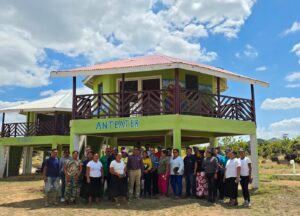
However, as Toka moves towards larger-scale farming and cattle rearing, a significant challenge arises: the limited availability of land. “The lack of available land is a pressing issue as we expand into agriculture, cattle rearing, and tourism. We urgently need land extensions to sustain our development,” the Toshao emphasized.
On the topic of tourism, Davis revealed that Toka has been actively working to build a robust tourism offering, tapping into its rich potential.
“In Toka’s tourism sector, we offer activities such as anteater spotting, mountain hikes, exploring historic sites and caves, wildlife spotting, horseback riding, traditional foods, and an authentic experience of daily life for the Macushi people,” he detailed.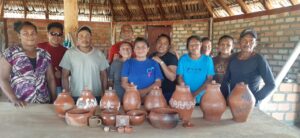
Among Toka’s unique tourist attractions is its renowned “pottery experience,” a tradition deeply embedded in the village’s history. Visitors can observe and participate in the traditional process of pottery-making, a skill passed down through generations of Macushi artisans.
“The pottery tradition is an integral part of Toka’s history,” Davis shared. “The caves and mountains nearby still house ancient clay pots. Toka is one of the few communities that actively shares its pottery skills with others.”
Unlike modern methods that rely on machinery, Toka’s artisans maintain the traditional approach, using only their hands and small stones to craft pots and utensils from clay.
Reflecting on his leadership, Toshao Davis said one of his motivations for running for village leader was his desire to make a meaningful difference in the community while improving the lives of its people.
Now serving his second term as Toshao, Davis, along with the Village Council and government support, has spearheaded advancements in tourism, agriculture, sports, and infrastructure.
Recent achievements include providing free internet access, acquiring essential equipment such as an excavator, tractor, and minibus, and implementing a portable water system that now supplies almost every home in the village.
Davis hopes to further enhance the community by ensuring homes have access to electricity and encouraging residents to invest in agriculture.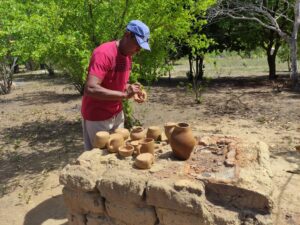
For those wishing to visit Toka, the village can be accessed via the Georgetown-to-Lethem trail. Alternatively, travelers can charter a plane from Ogle to Lethem, from where they can reach Toka by bus or motorcycle.




